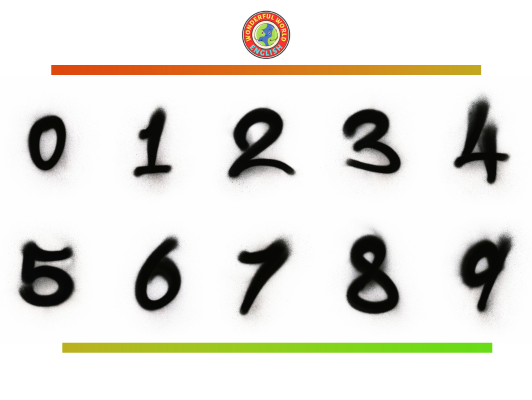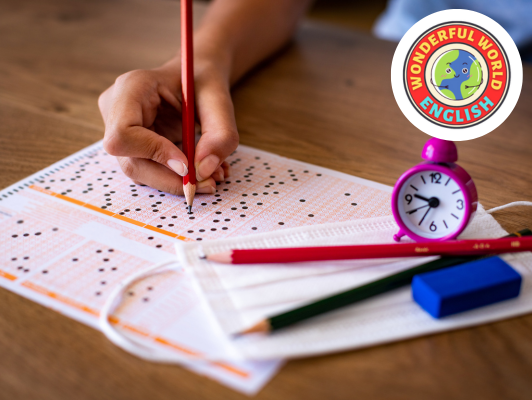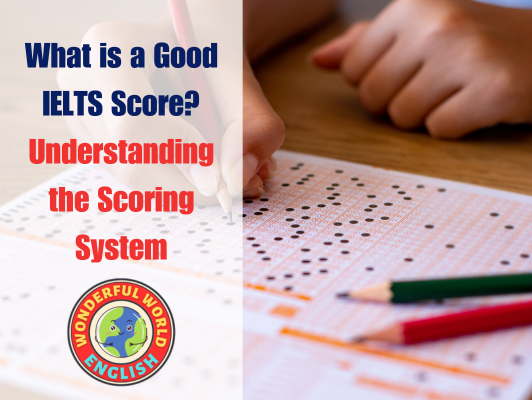Contents
Toggle
Meet David De’ Ath, founder, editor, and writer at Wonderful World English. With his extensive background as an English teacher, David provides valuable insights and practical tips on ESL for students and teachers alike.
Determining what constitutes a good IELTS score can be pivotal for those planning to study, work, or migrate to English-speaking countries.
The IELTS exam assesses individuals on four language skills: Listening, Reading, Writing, and Speaking.
Each skill is graded on a scale from 0 to 9, with these individual scores then averaged to provide an overall band score.
The overall IELTS score is a crucial factor that educational institutions, employers, and immigration authorities use to gauge an applicant’s proficiency in English.
The concept of a ‘good’ IELTS score is subjective and can vary depending on specific requirements set by universities, employers, or immigration bodies.
Generally, band scores of 6.5 or above are considered competent for most academic and professional contexts.
Higher band scores represent a higher level of English language proficiency, with scores closer to 9 reflecting an expert command of the language.
Nonetheless, the target score should always align with the specific criteria of the relevant institution or authority.
Key Takeaways
- A good IELTS score is often seen as subjective and varies according to institutional requirements.
- Individual skill band scores average out to determine the overall IELTS score.
- IELTS band scores correlate with specific levels of language proficiency.
Understanding IELTS Band Scores
The International English Language Testing System (IELTS) assesses an individual’s English proficiency on a scale from 0 to 9, with accompanying descriptors that characterize the user’s level of communication competence.
Score Scale and Meaning
Band scores in IELTS reflect a range of English language ability from “non-user” to “expert user”.
Scores are expressed in whole and half bands, such as 6.0 or 7.5, representing standardized levels of proficiency:
- 9.0 (Expert User): Fully operational command of the language.
- 8.0 (Very Good User): Fully operational command with only occasional unsystematic inaccuracies.
- 7.0 (Good User): Operational command with occasional inaccuracies and misunderstandings in some situations.
- 6.0 (Competent User): Generally effective command despite some inaccuracies and misunderstandings.
- 5.0 (Modest User): Partial command, likely to make many mistakes yet can handle basic communication.
- 4.0 (Limited User): Basic competence is limited to familiar situations.
- 3.0 (Extremely Limited User): Conveys and understands only general meaning in very familiar situations.
- 2.0 (Intermittent User): No real communication possible, except for the most basic information.
- 1.0 (Non User): Essentially no ability to use the language beyond possibly a few isolated words.
- 0 (Did not attempt the test): Did not answer the questions.
Band Score Requirements by Country
Different countries and institutions have varying band score requirements for visa applications, university admissions, and professional credentials.
For instance, to study at universities in the UK, an overall band score of 6.5 or 7.0 is typically necessary.
English-speaking countries like Australia, Canada, and New Zealand also have specific band score requirements for immigration and academic purposes, often ranging from 6.0 to 7.5 depending on the type of visa or course of study.
Interpreting the Overall Band Score
The overall band score is an average of the band scores for the Listening, Reading, Writing, and Speaking sections of the IELTS exam. Each section carries equal weight in the calculation.
If the average of the four components ends in .25, it is rounded up to the next half band, and if it ends in .75, it is rounded up to the next whole band.
For instance, an average score of 6.25 across the four sections becomes a 6.5 overall band score.
This score provides a clear and neutral indication of the test taker’s ability to communicate in English across all four language competencies.

IELTS Score Components
The IELTS exam assesses individuals on four language skills, with each section receiving a band score from 0 to 9.
These scores are then averaged to form the overall IELTS band score, reflecting the test taker’s proficiency in English.
Listening Score
The Listening component evaluates the ability to understand English as it is spoken in various social and educational contexts.
The section consists of four recordings, and the Listening score is based on the number of correct answers, which are then converted to the IELTS 9-band scale.
Reading Score
In the Reading section, individuals are tested on a wide range of reading skills.
The Reading score is determined by the accurate comprehension and interpretation of written English, with tasks varying between the Academic and General Training versions of the test.
Writing Score
The Writing section is divided into two tasks: writing a report based on a graphic or data set (Writing Task 1) and an essay in response to an argument or problem (Writing Task 2).
The Writing score evaluates coherence, vocabulary, grammar, and the ability to respond to the tasks appropriately.
Speaking Score
This segment tests the Speaking skills through a structured discussion with an examiner.
Test takers are scored on fluency, accuracy, pronunciation, and the use of vocabulary and grammar.
The Speaking score reflects the ability to communicate effectively in English.
IELTS exams can be conducted online and offline.
For a complete guide on the differences between online and offline IELTS exams, check out the guide below!
Related: IELTS Exam: Online vs Offline – Making the Right Choice

IELTS Scores and Language Proficiency
IELTS scores are a standardized measure of English language proficiency.
They reflect a test taker’s ability to communicate in English across four key language skills: listening, reading, writing, and speaking.
CEFR and CLB Correlation
IELTS test results closely align with the Common European Framework of Reference for Languages (CEFR) and the Canadian Language Benchmarks (CLB).
The CEFR divides language ability into six levels from A1 for beginners up to C2 for those who have mastered the language, while the CLB has 12 benchmarks for various language abilities in Canada.
- IELTS Band Score: 4.0-5.0
- CEFR Level: B1
- CLB Level: 4-5
- IELTS Band Score: 5.5-6.5
- CEFR Level: B2
- CLB Level: 6-7
- IELTS Band Score: 7.0-8.0
- CEFR Level: C1
- CLB Level: 8-9
- IELTS Band Score: 8.5-9.0
- CEFR Level: C2
- CLB Level: 10-12
Score Interpretation for Different Purposes
The interpretation of an IELTS score can vary for different purposes, such as immigration, academic studies, or employment.
For academic endeavors, many universities require a minimum IELTS score ranging from 6.0 to 7.5.
In contrast, for immigration purposes, a candidate may be expected to score at least CLB level 7, which is equivalent to an IELTS score of 6.0 per section.
- For Study:
- A score of 6.5 or higher is typically required for university admission.
- For Work:
- Most professional organizations require a minimum score of 7.0.
- For Immigration:
- The Express Entry program in Canada often requires a minimum of CLB 7.

Achieving a Good IELTS Score
To attain a favorable outcome on the IELTS exam, thorough preparation and an understanding of the scoring system are imperative.
This section guides test takers on how to bolster their study practices and comprehend the scoring criteria.
Preparation and Practice Tips
Steadfast preparation is essential for those aiming to achieve a high score on the IELTS test.
A recommended strategy includes:
- Regular Practice: Test takers should engage in daily practice to hone their English language skills across listening, reading, writing, and speaking.
- Sample Tests: Utilizing IELTS sample tests helps to familiarize with the question types and format of the actual exam.
- Feedback from Teachers: Feedback from experienced IELTS teachers can offer invaluable insights, highlighting areas that require further improvement.
Study Materials: A variety of study materials, including books and online resources, can assist in covering all the necessary content.
IELTS practice tests are particularly beneficial as they mirror the conditions of the real exam.
Understanding Scoring Criteria
The IELTS scoring system is both granular and comprehensive.
Each of the four skills—listening, reading, writing, and speaking—is assessed individually:
- Scoring Scale: The scoring for each section ranges from 0 to 9 in increments of 0.25, 0.5, or 0.75. The overall score is the average of these four components.
- Benchmark for Success: A score of 6.5 or higher is often considered good, reflecting ‘Upper-intermediate’ or ‘Advanced’ proficiency as per the Common European Framework of Reference (CEFR).
Understanding the criteria for each band score allows test takers to set realistic goals and focus their preparation efforts accordingly.

Conclusion
Determining what constitutes a good IELTS score is essential for individuals aiming to study, work, or migrate to English-speaking countries.
With each of the four language skills—Listening, Reading, Writing, and Speaking—evaluated on a 0 to 9 scale, a comprehensive understanding of this scoring system is crucial.
While a score of 6.5 or above is generally seen as competent for various academic and professional settings, specific requirements may vary, making it vital to align preparation with the criteria of the targeted institution or authority.
The overall band score, an average of individual skill scores, plays a pivotal role in opportunities abroad, reflecting one’s English proficiency to educational institutions, employers, and immigration bodies.
Ultimately, a ‘good’ IELTS score is subjective, aligning with personal goals and the benchmarks set by respective organizations, emphasizing the importance of tailored preparation and understanding of the IELTS scoring dynamics.
We hope you find value in this information; you can contact us if you require any support.
Have a wonderful day!
Image Attribution: All images licensed via canva.com





